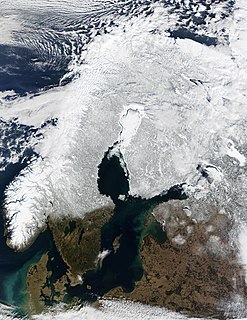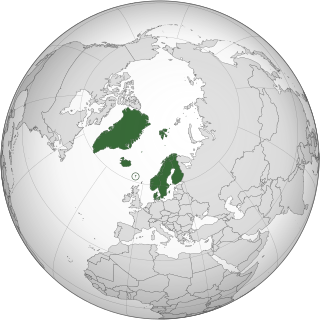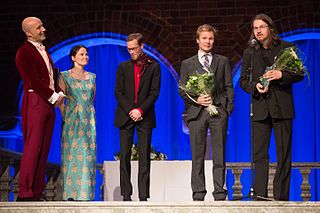Related Research Articles

Scandinavia is a subregion in Northern Europe, with strong historical, cultural, and linguistic ties.

The Nordic Council is the official body for formal inter-parliamentary Nordic cooperation among the Nordic countries. Formed in 1952, it has 87 representatives from Denmark, Finland, Iceland, Norway, and Sweden as well as from the autonomous areas of the Faroe Islands, Greenland, and Åland. The representatives are members of parliament in their respective countries or areas and are elected by those parliaments. The Council holds ordinary sessions each year in October/November and usually one extra session per year with a specific theme. The council's official languages are Danish, Finnish, Icelandic, Norwegian, and Swedish, though it uses only the mutually intelligible Scandinavian languages—Danish, Norwegian, and Swedish—as its working languages. These three comprise the first language of around 80% of the region's population and are learned as a second or foreign language by the remaining 20%.

The flag of the Faroe Islands is an offset cross, representing Christianity. It is similar in design to other Nordic flags – a tradition set by the Dannebrog of Denmark, of which the Faroe Islands are an autonomous territory.

The Inatsisartut, also known as the Parliament of Greenland in English, is the unicameral parliament of Greenland, an autonomous territory in the Danish realm. Established in 1979, it meets in Inatsisartut, on the islet of Nuuk Center in central Nuuk.

The Joint Committee of the Nordic Social Democratic Labour Movement, better known by its abbreviation SAMAK, is an alliance of social democratic parties and labour councils in the Nordic countries. SAMAK consists of all social democratic parties and trade union organisations in the Nordic countries, including in Greenland, the Faroe Islands and Åland. The current President of the Committee as of 2021 is Jonas Gahr Støre, the leader of the Norwegian Labour Party and Prime Minister of Norway. Jan-Erik Støstad is the General Secretary, and Kjersti Stenseng is Chair of the Board.
The Nordic Council Literature Prize is awarded for a work of literature written in one of the languages of the Nordic countries, that meets "high literary and artistic standards". Established in 1962, the prize is awarded every year, and is worth 350,000 Danish kroner (2008). Eligible works are typically novels, plays, collections of poetry, short stories or essays, or other works that were published for the first time during the last four years, or in the case of works written in Danish, Norwegian, or Swedish, within the last two years. The prize is one of the most prestigious awards that Nordic authors can win.

The Nordic Passport Union allows citizens of the Nordic countries – Iceland, Denmark, Norway, Sweden, and Finland – to travel and reside in another Nordic country without any travel documentation or a residence permit. Since 25 March 2001, all five states have also been within the Schengen Area. The Faroe Islands are part of the Nordic Passport Union but not the Schengen Area, while Greenland and Svalbard are outside both. However, Greenland has an open border with all Nordic countries, and allows Nordic citizens to enter, settle and work without requiring a passport or permits. Svalbard allows Nordic citizens to settle and work without permits, as a result of the Svalbard Treaty; however, valid travel documentation is required to enter Svalbard. Norwegian citizens may use other documents such as a Norwegian driving licence until 31 December 2021. Furthermore, as citizens of a Nordic country, those from Svalbard and Greenland are permitted to reside in any other Nordic country.
The subdivisions of the Nordic countries are similar given the countries' shared culture and history.

The Nordic Council Music Prize is awarded annually by NOMUS, the Nordic Music Committee. Every two years it is awarded for a work by a living composer. In the intervening years it is awarded to a performing musician or ensemble.
The Hyundai Nordic Music Prize is an annual award for the Best Nordic Album Of The Year, inspired by the Mercury Prize and introduced in 2010. The prize was initiated by the by:Larm conference in Norway. The first Nordic Music Prize was presented by the Prince Of Norway during by:Larm in Oslo in February 2011.
Scandinavian literature or Nordic literature is the literature in the languages of the Nordic countries of Northern Europe. The Nordic countries include Denmark, Finland, Iceland, Norway, Sweden, and Scandinavia's associated autonomous territories. The majority of these nations and regions use North Germanic languages. Although majority of Finns speak Uralic languages, Finnish history and literature are clearly interrelated with those of both Sweden and Norway who have shared control of various areas and who have substantial Sami populations/influences.

The Faroe Islands, or simply the Faroes or Faeroes, are a North Atlantic archipelago located 320 kilometres (200 mi) north-northwest of Scotland, and about halfway between Norway and Iceland. Like Greenland, it is an autonomous territory of the Kingdom of Denmark. The islands have a total area of about 1,400 square kilometres (540 sq mi) with a population of 53,358 as of June 2021.
The Nordic Council Film Prize is an annual film prize administered by the Nordic Council. The first award was handed out in 2002 to celebrate the Nordic Council's 50th anniversary. Since 2005 the prize has been annual. One winner is chosen from submissions from the five Nordic countries. In 2008, the prize money of the Nordic Council Film Prize was €47,000. According to the Nordic Council, the prize is given for "the creation of an artistically original film that is rooted in Nordic cultural circles".

The Nordic countries are a geographical and cultural region in Northern Europe and the North Atlantic. It includes the sovereign states of Denmark, Finland, Iceland, Norway and Sweden as well as the autonomous territories of the Faroe Islands and Greenland, and the autonomous region of Åland.
The Arctic Policy of the Kingdom of Denmark defines the Kingdom's foreign relations and policies with other Arctic countries, and the Kingdom's Strategy for the Arctic on issues occurring within the geographic boundaries of "the Arctic" or related to the Arctic or its peoples. The Kingdom of Denmark is an Arctic nation with the importance of The unity of the Realm with Denmark in Europe and the self-governing autonomous countries - Greenland in the Arctic and the Faroe Islands in the North Atlantic.
West Nordic Council's Children and Youth Literature Prize is a literary award, which was established in 2002 by the West Nordic Council. The prize is awarded every second year at the annual meeting of the West Nordic Council, normally in August. The three countries of the North West region of Northern Europe are Greenland, Iceland and the Faroe Islands. These countries nominate one literary work each. The winner gets a reward of DKK 60 000 and his or her book is translated into the other two languages of the region and into one of the Scandinavian languages: Norwegian, Danish, Swedish or Finnish, without any expenses for the winner.
The Nordic Children's Book Prize is a children's literary prize which was establishished in 1985 by the Nordic Association of School Librarians. The winners received an amount of money and a diploma.
This article is a comparison of the Nordic countries.

The Nordic Council Children and Young People's Literature Prize is awarded for a work of children's or young adult literature written in one of the languages of the Nordic countries. It was established by the Nordic Council in 2012 after an initiative by ministers of culture in the Nordic countries. The prize was first awarded on 30 October 2013.
References
- 1 2 3 4 "About the Environment Prize". Nordic Council. Retrieved 19 October 2016.
- 1 2 "The City of Reykjavik wins the Nordic Council Nature and Environment Prize 2014". Nordic Council. 29 October 2014. Retrieved 19 October 2016.
- 1 2 "Previous prize winners and nominees". Nordic Council. Archived from the original on 27 October 2016. Retrieved 19 October 2016.
- ↑ Nordic Council of Ministers (2001). Towards a Sustainable Nordic Tourism. ISBN 9789289306447 . Retrieved 19 October 2016.
- 1 2 "Winner of the Nordic Council Nature and Environment Prize 2015". Nordic Council. Archived from the original on 8 December 2015. Retrieved 19 October 2016.
- ↑ "Nominations for the Nordic Council Environment Prize 2016". Nordic Council. Retrieved 19 October 2016.
- ↑ "Winner of the Nordic Council Environment Prize 2016". Nordic Council. Archived from the original on 13 January 2017. Retrieved 1 November 2016.
- ↑ "Nominations for the Nordic Council Environment Prize 2017". Nordic Council. Retrieved 5 November 2017.
- ↑ "Nordic Council Environment Prize 2017 to RePack". Nordic Council. 2016-01-11. Retrieved 2017-11-05.
- ↑ "Nominations for the Nordic Council Environment Prize 2018". Nordic Council. Retrieved 21 February 2019.
- ↑ "Nordic Council Environment Prize 2018 to PISUNA". Nordic Council. Retrieved 2019-02-21.
- ↑ "Nominations for the Nordic Council Environment Prize 2019". Nordic Council.
- ↑ "Greta Thunberg declines Nordic Council Environment Prize".